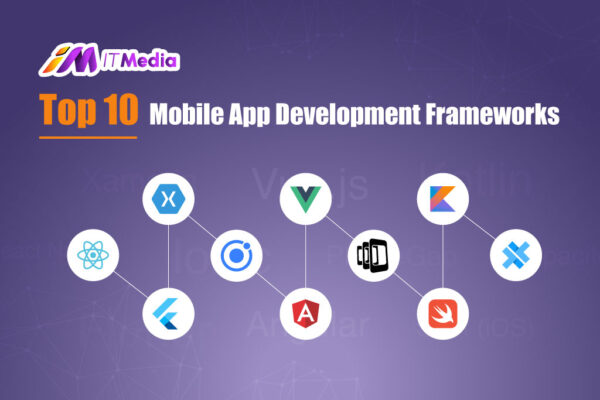
In the rapidly changing field of mobile app development, choosing the right framework is necessary for success. Making this choice has a significant impact on app performance, development speed, and the overall user experience.
In this article, we will look at the top 10 mobile app development frameworks and their features and benefits.
Criteria for selecting top frameworks
Before exploring the top 10 mobile app development frameworks, it is important to understand their selection criteria.
Factors such as cross-platform compatibility, development speed, performance and community support play a major role in determining the effectiveness of a framework.
Top 10 mobile app development frameworks list:
1. React Native
React Native has emerged as a leading cross-platform framework, allowing developers to build mobile applications using a single codebase. Leveraging the power of React, it combines efficiency with a native-like experience.
Key features and advantages
1. Reusable components
React Native’s modular architecture promotes code reusability, reducing redundancy and easing maintenance. Developers can create components once and deploy them across different platforms.
2. Native performance
The framework enables the use of native modules, ensuring high-performance levels comparable to apps built with native languages.
2. Flutter
Flutter, Google’s UI toolkit, is gaining popularity for its ability to create natively compiled applications for mobile, web, and desktop from a single codebase.
Key features and advantages
1. Single codebase for iOS and Android
Flutter’s “write once, run anywhere” approach streamlines development by eliminating the need for separate codebases for iOS and Android.
2. Hot reload for faster development
The hot reload feature allows developers to instantly see the effects of code changes, speeding up the development cycle.
3. Xamarin
Xamarin, backed by Microsoft, is a robust framework for building cross-platform apps using C# and .NET.
Key features and advantages
1. Native-like performance
Xamarin provides native-like performance by compiling the code into native binaries, ensuring optimal speed and responsiveness.
2. Extensive library support
Developers benefit from the extensive libraries and frameworks available in the .NET ecosystem, enhancing productivity.
4. Ionic
Ionic stands out as a versatile framework, empowering developers to create hybrid mobile applications using familiar web technologies.
Key features and advantages
1. Web technologies (HTML, CSS, JavaScript)
Ionic leverages standard web technologies, allowing developers to utilize their existing skills for app development.
2. Extensive plugin ecosystem
The framework boasts an extensive plugin ecosystem, providing access to a wide range of functionalities and features.
5. Angular
Angular, a comprehensive front-end framework, extends its capabilities to mobile development through integration with NativeScript.
Key features and advantages
1. Component-based architecture
Angular’s component-based architecture enhances code organization and reusability, simplifying mobile app development.
2. Angular CLI for streamlined development
The Angular CLI streamlines the development process, offering commands for creating components, services, and modules.
6. Vue.js
Vue.js, known for its simplicity and flexibility, can be integrated with frameworks like Quasar for efficient mobile app development.
Key features and advantages
1. Lightweight and easy to integrate
Vue.js is lightweight, making it easy to integrate with mobile development frameworks like Quasar.
2. Reactive data binding
The reactive data binding feature simplifies state management, enhancing the overall development experience.
7. PhoneGap (Apache Cordova)
PhoneGap, also known as Apache Cordova, facilitates the development of cross-platform mobile applications using web technologies.
Key features and advantages
1. Cross-platform compatibility
PhoneGap ensures cross-platform compatibility, enabling the deployment of apps on various devices seamlessly.
2. Access to device features through plugins
Developers can access device features, such as camera and GPS, through plugins, enhancing app functionality.
8. Swift (iOS)
Swift, developed by Apple, has become the go-to programming language for building high-performance iOS applications.
Key features and advantages
1. Performance optimization
Swift’s syntax and runtime performance contribute to the creation of fast and efficient iOS apps.
2. Safety and modern syntax
The language prioritizes safety and readability, ensuring a modern and secure development environment.
9. Kotlin (Android)
Kotlin, endorsed by Google, has gained widespread adoption as the preferred language for Android app development.
Key features and advantages
1. Interoperability with Java
Kotlin seamlessly integrates with existing Java code, making the transition to Kotlin smoother for developers.
2. Conciseness and expressiveness
Kotlin’s concise syntax and expressive features enhance code readability and development speed.
10. Capacitor
Capacitor, developed by Ionic, is a cross-platform app development framework that focuses on providing access to native APIs.
Key features and advantages
1. Cross-platform support
Capacitor supports the development of cross-platform apps, offering flexibility in targeting various operating systems.
2. Access to native APIs
Developers can access native device features through Capacitor, enhancing the functionality of their applications.
Conclusion
In conclusion, choosing the right mobile app development framework is a critical decision that impacts the success of a project. Each framework discussed in this article offers unique features and advantages, catering to diverse development needs.
# FAQs
What are the key advantages of React Native for cross-platform mobile app development?
Explore how React Native’s reusable components and native performance contribute to efficient cross-platform development.
How does Flutter streamline mobile app development with a single codebase for both iOS and Android?
Discover the time-saving benefits of Flutter’s “write once, run anywhere” approach and its hot reload feature for faster development.
Why choose Xamarin for cross-platform app development, and how does it leverage .NET and C#?
Learn about Xamarin’s native-like performance and extensive library support, backed by the power of .NET and C#.
What makes Ionic stand out as a framework for hybrid mobile apps, and how does it utilize web technologies?
Explore the versatility of Ionic, leveraging familiar web technologies like HTML, CSS, and JavaScript for hybrid mobile app development.
How does Swift optimize iOS app development, emphasizing performance, safety, and modern syntax?